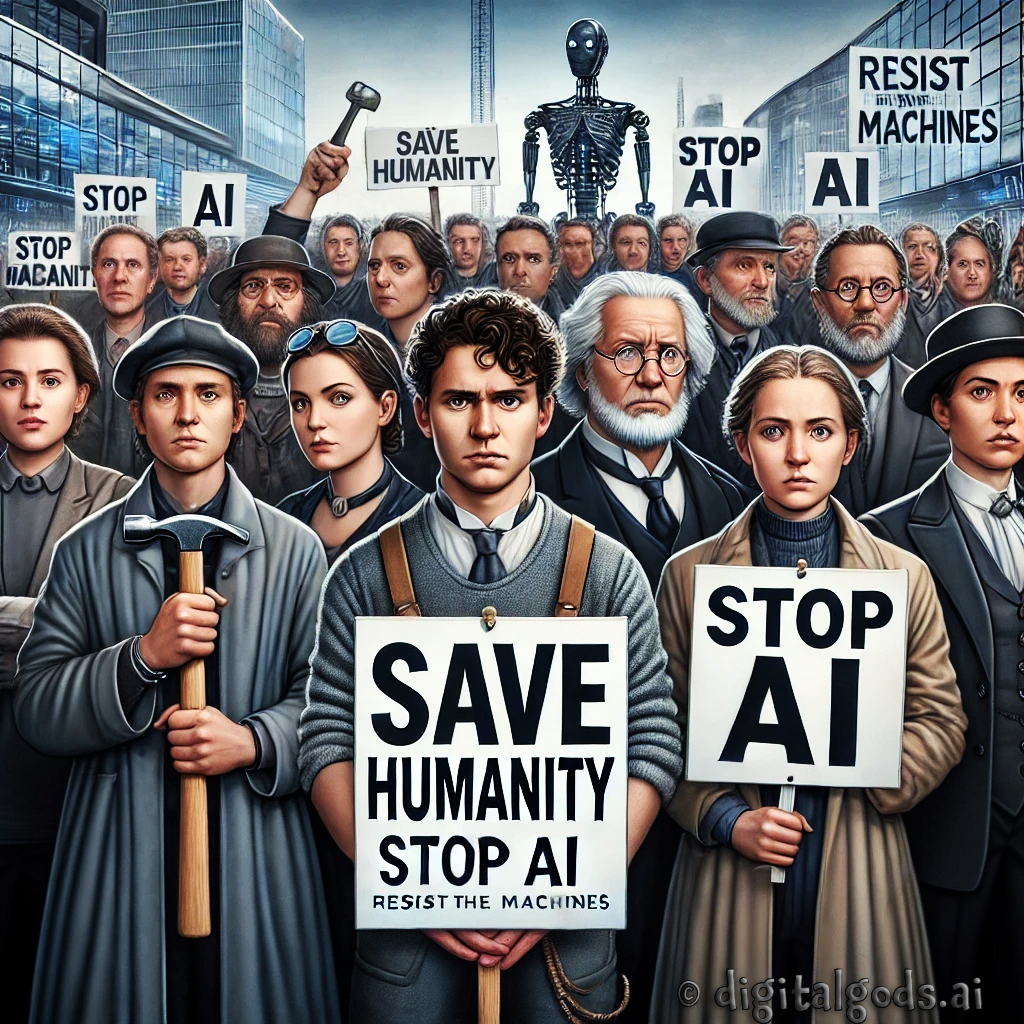Empathy for the Luddites

In the early 19th century, a group of English textile workers known as the Luddites emerged in response to the rapid technological advancements of the Industrial Revolution. These workers took their name from Ned Ludd, a possibly mythical figure said to have lived in the late 18th century. According to legend, Ludd, a weaver, smashed two knitting frames in a fit of rage after being reprimanded for not working efficiently enough. His act of rebellion became a symbol of resistance against machines that were seen as threats to the livelihoods of skilled artisans.
The Luddites, inspired by the legend of Ned Ludd, feared that mechanized looms and knitting frames would not only displace their jobs but also erode the craftsmanship they held dear. Their protests—destroying machinery and staging demonstrations—have since rendered "Luddite" a synonym for anyone resistant to technological change. However, the Luddites' opposition was not to technology itself, but to the economic and social consequences of industrialization. They saw mechanization as a threat to their livelihoods and autonomy, as factories devalued skilled labor. Over time, their movement expanded across England, targeting factories that prioritized profit over workers' well-being.
Fast forward to the 21st century, and we find ourselves amid another seismic technological shift: the rise of artificial intelligence. Just as the Luddites grappled with the uncertainties of mechanization, many today are anxious about AI's potential to upend industries, displace jobs, and challenge the essence of what it means to be human. This apprehension isn't without merit. As AI systems become increasingly sophisticated—capable of learning, reasoning, and performing tasks once thought to require uniquely human intelligence—the implications for society are profound.
Understanding the Modern Luddite
To dismiss those who fear AI as mere technophobes is to overlook genuine concerns accompanying such transformative change. The Luddites weren't opposed to technology itself; they protested the socioeconomic consequences imposed upon them without consent or benefit. Similarly, today's AI skeptics are often more concerned with ethical, economic, and existential risks than with the technology per se.
We can't ignore stories of workers displaced by automation, communities disrupted by industrial shifts, and the widening gap between those who can adapt to new technologies and those who cannot. Moreover, the potential misuse of AI—in surveillance, weaponization, and information manipulation—poses risks extending beyond individual livelihoods to the very fabric of society and global stability.
The Existential Risks of AI
The unease surrounding AI also taps into deeper existential fears. What happens when machines can outperform humans in virtually every intellectual task? How do we find purpose and meaning in a world where our traditional roles become obsolete? These questions echo the Luddites' fears but on a grander, more global scale. The potential for AI to surpass human intelligence, known as artificial general intelligence (AGI), raises pressing concerns about control, ethics, and the future trajectory of humanity.
Prominent figures like Stephen Hawking and Elon Musk have sounded alarms about the dangers of uncontrolled AI development. The fear transcends job displacement; it's about the possibility of creating entities that could, intentionally or not, cause harm on an unprecedented scale.
Empathy as a Path Forward
Understanding and empathizing with these fears is crucial. Empathy doesn't require us to agree with every concern but to recognize their validity and the emotions fueling them. It means acknowledging the discomfort that accompanies change and the challenges faced by those who feel left behind.
Empathy can bridge the gap between technologists and skeptics, fostering dialogue that addresses legitimate concerns while dispelling myths. It paves the way for inclusive strategies that consider the well-being of all stakeholders, not just the relentless advancement of technology.
Facing the Inevitable: Adapting and Thriving
Artificial intelligence isn't a passing trend; it's becoming an integral part of our evolving society. Rather than resisting its advancement, we can focus on proactive ways to adapt and harness its potential for collective benefit.
Consider education and reskilling. Embracing lifelong learning can equip individuals with the skills needed in an AI-driven economy. Governments, educational institutions, and businesses can collaborate to provide accessible training in areas where human skills complement AI—such as creative problem-solving, emotional intelligence, and ethical decision-making.
Advocating for responsible AI development ensures that ethical considerations are at the forefront of technological progress. This includes promoting transparency, accountability, and inclusivity in AI systems. Effective policies and regulations can mitigate risks by setting standards for AI deployment, protecting privacy, and ensuring that the benefits of AI are widely distributed.
Viewing AI as a tool rather than a replacement opens up possibilities for human-AI collaboration. When AI handles repetitive tasks, humans can focus on areas requiring creativity and complex judgment. Open community engagement about the impact of AI can demystify the technology and reduce fear. Involving diverse voices ensures that a broad spectrum of perspectives shapes our future.
Turning Fear into Opportunity
The story of the Luddites serves as a historical lesson on the consequences of ignoring the human element in technological advancement. By learning from the past, we can strive to ensure that the rise of AI doesn't repeat the same mistakes. Empathy enables us to address fears constructively, transforming anxiety into opportunity.
AI holds the potential to solve some of humanity's most pressing challenges, from healthcare breakthroughs to environmental sustainability. By approaching its development and implementation with empathy and foresight, we can work toward a future where technology enhances human life rather than diminishes it.
Conclusion
Empathy for the modern "Luddite" isn't just about understanding fear; it's about recognizing the shared humanity that binds us in the face of change. As we stand in the midst of an AI-driven era, let's remember the lessons of the past and strive to create a future that values both technological progress and the people it affects. By confronting the inevitability of artificial intelligence head-on and embracing strategies to adapt and thrive, we can turn potential existential risks into avenues for unprecedented growth and harmony.